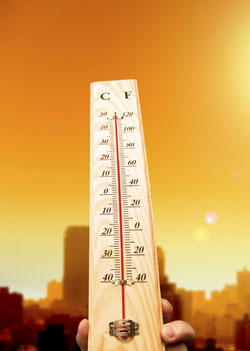
While most people anxiously await the arrival of warm summer days, the arrival of hot weather, burning sun, and other seasonal factors present numerous health challenges to seniors. Keep these eight important things in mind when helping your aging loved one beat the heat this summer.
1. Hydrate, Hydrate, Hydrate
Being proactive about keeping seniors hydrated is especially important -- particularly considering that a full third of seniors in long-term care facilities experience dehydration. Dehydration in the elderly can quickly become a serious issue. When older adults become dehydrated, they may experience muscle cramps, disorientation, confusion, and many other threatening healthcare conditions. If they are severely dehydrated, they may go into shock which can be life-threatening. If your loved one is non-verbal, he/she may be unable to communicate feelings of thirst. Not only that but the issue is compounded by the fact that feelings of thirst decline with age.
If you wait for your loved one to express feelings of thirst, the odds are high that dehydration has already set in. Avoid caffeine and alcohol which can exacerbate the situation. If you are having trouble with a non-compliant loved one, this video offers some useful advice.
2. Turn Up the Air
When the weather turns hot and humid, air conditioning is an important part of keeping seniors cool. If your aging loved one's home doesn't have air conditioning, plan on spending time in a cooler location. Take a trip to the movies, head to the library, or visit a friend.
3. Stay Out of the Sun
Prime sun hours are between the hours of 10 a.m. and 4 p.m. If your loved one needs to be outside during a heatwave, make sure activities are limited to early mornings and late afternoons/evenings when the sun's rays have declined in intensity.
Also, seniors should always wear sunscreen, hats, and UVA/UVB blocking sunglasses and to help reduce damage to skin and eyes.
4. Check In
When the thermometer rises, make sure to check in with elderly relatives -- particularly if they don't have air conditioning. If you aren't nearby, ask a reliable friend or neighbor to check in on your behalf.
5. Doublecheck Medications
Seniors take many medications, some of which can have side effects caused by the sun. Be sure to review your loved one's medication and/or check-in with a member of his/her healthcare team if you have any questions.
As medications can also have unexpected adverse interactions with each other, it's also important to have a physician regularly review your loved one's list of medications.
6. Know the Signs
Understanding and watching for the signs of heatstroke can help you ensure that your loved one will get the care he/she needs. Dry skin, confusion, fatigue, headache, lethargy, rapid pulse, and nausea are signs of heatstroke and require prompt medical attention.
Be sure to keep a list of emergency contact numbers handy in case a medical problem does arise.
7. Dress for the Weather
You wouldn't send your aging loved one out into the cold without the right clothing. Summer calls for the same attention to clothing and accessories. Seek out the three L's: loose, light-colored, and lightweight when helping your aging loved one make warm-weather wardrobe selections.
8. Keep Bugs at Bay
Seniors are particularly vulnerable to mosquito-borne diseases, like encephalitis and West Nile Virus. If you're headed outdoors, be sure to use mosquito repellant to help lower the risk of a potentially dangerous bug bite.
While summer is a welcome respite from dealing with cold, snow, ice, and other common senior hazards, summer is not without its share of potential concerns. Keeping these eight things in mind can help ensure that your favorite season weathers the weather this summer.

